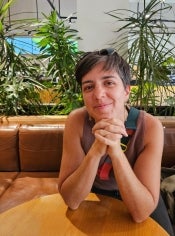Anthropologists with expertise in human rights law, the environment join ASU faculty

Mariam Abazeri (left), an environmental anthropologist, and Méadhbh McIvor, a social anthropologist, join Arizona State University for the fall 2024 semester. Courtesy photos
This fall, two notable anthropologists are joining the School of Human Evolution and Social Change and bringing with them extensive experience and knowledge about social and environmental anthropology.
Mariam Abazeri is an environmental anthropologist and is joining Arizona State University from the University of Miami. Abazeri's current research focuses on responses to the climate and environmental crises in Iran.
Méadhbh McIvor is a social anthropologist joining ASU from the University of Manchester. McIvor’s research focuses on the study of law and religion.
ASU News spoke with both Abazeri and Mclvor about their research and plans at ASU.
Mariam Abazeri, Presidential Postdoctoral Fellowship Scholar
Question: Can you tell us about your research and areas of interest?
Answer: I’m an environmental anthropologist studying the effects of globalization and climate change on natural resource-dependent communities. My research asks what kind of impact people can have on their environment and how those changes can shape local culture. My work in Iran examines the intersections of political economy, social inequality and environmental vulnerability in a highly water-stressed area of the country, and the ways residents use media-making to challenge the gendered impacts of environmental change. For my next project, I’m interested in examining how groundwater governance, a critical issue for people living in arid regions like Iran and Arizona, becomes increasingly challenging in tropical areas like Costa Rica that only recently have begun relying more on groundwater irrigation. In this research, I’m interested in studying how community-based institutions shape water management and access in areas vulnerable to both climate change and competing economic interests.
Before coming to ASU, I was at the University of Miami, where I completed my PhD in environmental science and policy. I have a Master of Arts from the Institut d’études politiques de Paris (Sciences Po) in environmental policy and a Bachelor of Arts from the University of Georgia in international relations.
Q: Why do you enjoy your career, and what you are looking forward to at ASU?
A: I love that as an anthropologist, my job is inherently social and interdisciplinary. I enjoy doing fieldwork and learning from people’s experiences to create more channels for dialogue. Before beginning my doctorate, I had been working in South and West Asia with environmental groups that were part of an association called the ICCA Consortium, a network of organizations advocating for territories and areas conserved by Indigenous peoples and local communities. Using participatory action research methods, we would travel around asking people about their everyday concerns and work with them to develop environmental projects that advocated for their needs at different scales. This set the tone for my own doctoral work and really brought into focus the kind of research I was interested in pursuing. At Arizona State University and at the School of Human Evolution and Social Change, I’m excited to be part of a community that values interdisciplinary research and am eager to learn from colleagues and students about what also gets them going!
Q: Anything else you would like others at ASU to know about you?
A: I love watching and working on documentaries, and in my free time, I also co-direct the Society for Visual Anthropology Film and Media Festival.
Méadhbh McIvor, associate professor
Question: Can you tell us about your academic career before coming to ASU?
Answer: I’m coming to Arizona State University from the University of Manchester, where I worked in the Department of Social Anthropology from 2021–24. Prior to my time at Manchester, I held a junior research fellowship at the University of Oxford and taught anthropology and religious studies at University College London and the University of Groningen, the Netherlands.
Q: Can you tell us about your research?
A: I specialize in the study of law and religion — and the interaction of the two. I’ve carried out research with religious communities in London, UK, and Arizona.
A running theme in my work is the instrumentalization of human rights law for competing ends — that is, the way different groups of people, including religious organizations and individuals, use the law strategically to achieve — possibly conflicting — goals. My first book, “Representing God: Christian Legal Activism in Contemporary England,” focuses on this phenomenon in the context of the United Kingdom. It explores evangelical activists’ use of human rights-based law to challenge policies that promote LGBTQ+ inclusion, multiculturalism and secularism.
While my first ethnographic project focused on a socially conservative religious movement, my second involves a religious community that self-defines as liberal or progressive. This research investigates the pursuit of justice among Unitarian Universalists, or UUs, right here in Arizona. My work with UUs explores the relationship between religion and civic engagement in a context of political polarization, but also touches on topics such as genealogy, the meaning of “values” and the category of belief.
My next ethnographic project will likely take place in Ireland, where I’m from — although the details are still taking shape!
Q: Why do you enjoy your career, and what you are looking forward to at ASU?
A: There is nothing on this Earth as interesting as other human beings. Given that anthropology is the study of humankind, I must have one of the most interesting jobs in the world.
It’s a bit of a cliché, but anthropologists often say that our discipline is about “making the strange familiar and the familiar strange.” By studying cultural practices we’re unfamiliar with, we begin to relativize our own “common sense” understandings of the world. This shift in perspective can be profound. It’s something I remember from my own undergraduate days: the sudden realization that something I thought was a universal value was actually a culturally-specific one. Now that I’m a professor myself, one of my favorite parts of the job is seeing students have that same experience. I start teaching in January and hope I get to share those moments with students here at ASU.
Alongside research and teaching, I’m excited to learn from my new colleagues — and students, of course — at the School of Human Evolution and Social Change. Anthropology departments in the UK typically focus on sociocultural anthropology, so I’m looking forward to learning about the other fields taught at the school, including archaeology and evolutionary anthropology. There’s lots to learn — and I couldn’t be in a better place to learn it!
More University news

3 ASU students earn Goldwater Scholarships for STEM research excellence
Three Arizona State University students have been named Goldwater Scholars for 2025, placing them among the nation’s most promising undergraduates pursuing research careers in science, engineering…

Provost Teaching Awardees, Charter Professors empower local communities, students
The ASU Charter embodies the university’s commitment to student success and research of public value and responsibility to the community. In recognition of its importance, each year, Executive…

New online Bachelor of Social Work program exceeding enrollment expectations
Social workers are in big demand.Citing U.S. Bureau of Labor Statistics figures, the National Association of Social Workers projected the profession will grow 7% by 2033, faster than the average for…



